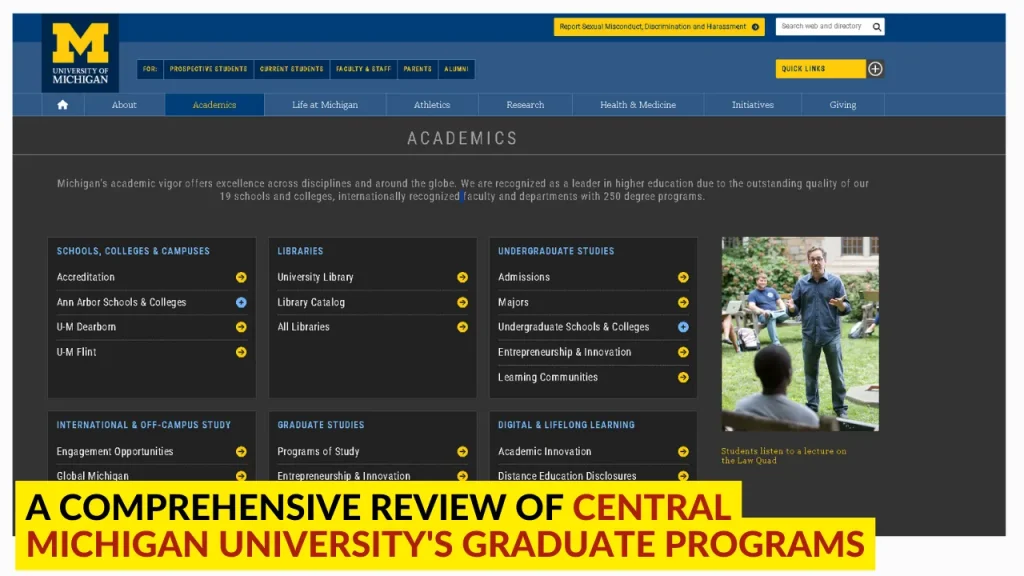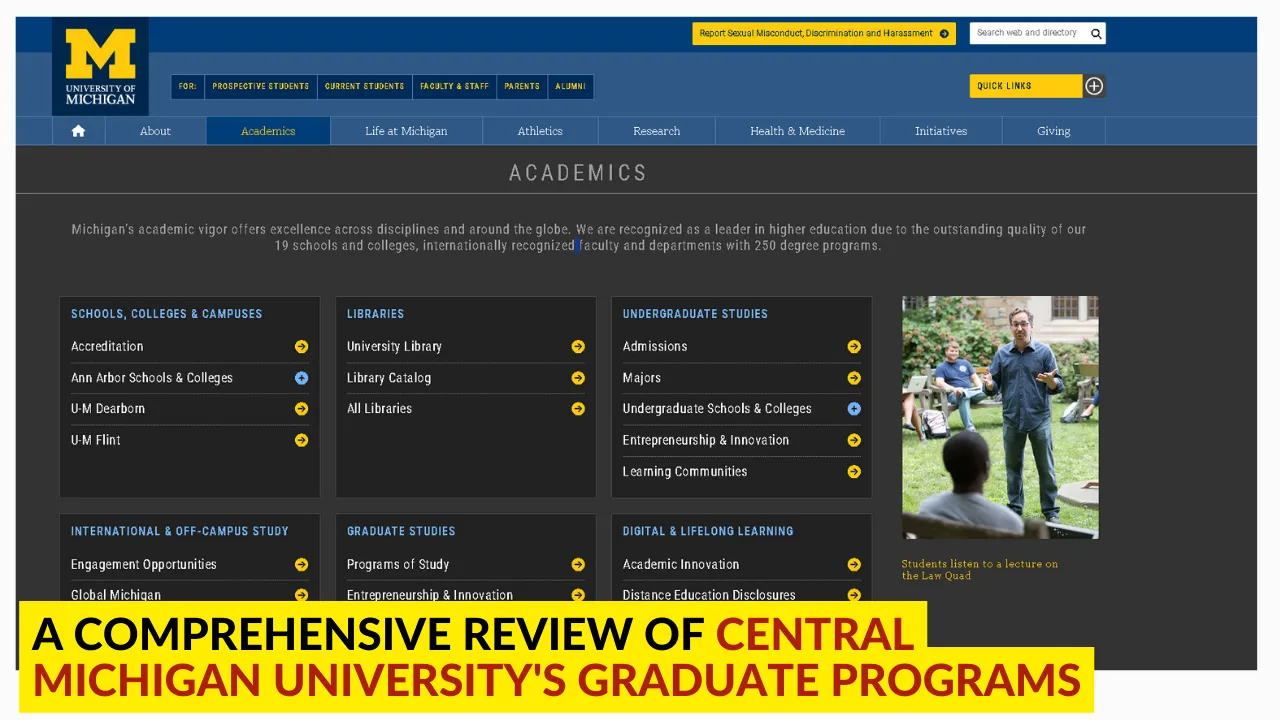
Introduction:
Central Michigan University (CMU), nestled in the heart of Michigan, stands as a beacon of academic excellence and innovation. Renowned for its commitment to providing high-quality education, CMU offers a diverse array of graduate programs that cater to a spectrum of interests and career aspirations. In this comprehensive review, we delve deep into the graduate programs at Central Michigan University, exploring the academic offerings, faculty expertise, research opportunities, and the unique characteristics that set CMU apart in the realm of higher education.
I. A Brief Overview of Central Michigan University:
Before delving into the specifics of CMU’s graduate programs, it’s essential to understand the university’sbackground and ethos. Founded in 1892, CMU has evolved into a comprehensive public research university with a mission to prepare students for a global society. The campus, situated in Mount Pleasant, offers a vibrant and inclusive community that fosters intellectual growth and personal development.
II. The Diversity of Graduate Programs:
One of CMU’s strengths lies in the diversity of its graduate programs. From business and education to science and healthcare, CMU caters to a wide range of academic disciplines. Let’s explore some of the key graduate programs that highlight CMU’s commitment to academic excellence:
A. College of Business Administration:
CMU’s College of Business Administration boasts a rich array of graduate programs designed to equip students with the skills and knowledge required for success in the dynamic world of business. The Master of Business Administration (MBA) program stands out as a flagship offering, emphasizing strategic thinking, leadership, and innovation.
B. College of Education and Human Services:
At the forefront of shaping future educators and human services professionals, CMU’s College of Education and Human Services provides a comprehensive range of graduate programs. The Master of Arts in Educational Leadership, for instance, focuses on developing effective leaders in educational settings, ensuring they are well-equipped to navigate the challenges of today’s educational landscape.
C. College of Science and Engineering:
For those inclined towards scientific inquiry and technological advancements, CMU’s College of Science and Engineering offers an array of graduate programs. From computer science and engineering management to biomedical sciences, students can immerse themselves in cutting-edge research and interdisciplinary collaboration.
D. College of Health Professions:
In response to the growing demand for skilled healthcare professionals, CMU’s College of Health Professions provides graduate programs that prepare students for leadership roles in the healthcare industry. The Master of Science in Physician Assistant (MSPA) program, for example, combines rigorous academic training with hands-on clinical experiences to produce competent and compassionate healthcare providers.
III. Faculty Excellence and Research Opportunities:
Central Michigan University prides itself on its distinguished faculty members who are experts in their respective fields. The faculty’s commitment to fostering a culture of research and innovation greatly enhances the graduate experience at CMU. Here are some key aspects of CMU’s faculty excellence and research opportunities:
A. Faculty Expertise:
The strength of any academic institution lies in the expertise of its faculty, and CMU excels in this regard. Professors at CMU are not only accomplished educators but also active contributors to their fields of study. Many faculty members engage in groundbreaking research, publish in reputable journals, and participate in conferences, bringing the latest knowledge and insights into the classroom.
B. Research Centers and Institutes:
CMU houses several research centers and institutes that serve as hubs for innovation and collaboration. These centers cover a wide range of disciplines, from neuroscience and environmental science to business analytics and educational research. Graduate students have the opportunity to engage in meaningful research projects, working alongside faculty members and fellow students to address real-world challenges.
C. Interdisciplinary Collaboration:
CMU actively encourages interdisciplinary collaboration, recognizing that many of today’s complex problems require multifaceted solutions. Graduate students often find themselves working across disciplines, gaining a holistic understanding of their field and expanding their skill set. This collaborative approach not only enriches the academic experience but also prepares students for the interdisciplinary nature of modern workplaces.
IV. Unique Features and Campus Life:
Beyond academic offerings and research opportunities, Central Michigan University distinguishes itself through unique features and a vibrant campus life. These aspects contribute to a well-rounded graduate experience at CMU:
A. Global Engagement:
CMU is committed to preparing students for success in a globalized world. The university offers various opportunities for international engagement, including study abroad programs, international research collaborations, and cultural exchange initiatives. Graduate students can broaden their perspectives and gain valuable international experience, enhancing their readiness for a diverse and interconnected professional landscape.
B. Technology Integration:
As a forward-thinking institution, CMU places a strong emphasis on technology integration in education. Graduate students benefit from state-of-the-art facilities, online learning resources, and collaborative platforms that enhance their academic experience. This commitment to technology ensures that graduates are well-equipped with the digital skills demanded in today’s workforce.
C. Campus Resources:
CMU’s campus is equipped with a myriad of resources designed to support graduate students in their academic pursuits. From well-equipped libraries and research laboratories to specialized career services, students have access to the tools they need for success. The university also prioritizes mental health and wellness, offering counseling services and recreational facilities to foster a healthy and balanced lifestyle.
D. Community Engagement:
The sense of community at CMU is palpable, creating an environment where students feel connected and supported. The university actively promotes community engagement through service-learning opportunities, civic participation initiatives, and outreach programs. Graduate students have the chance to make a positive impact both on campus and in the wider community, enhancing their sense of social responsibility.
V. Admissions and Financial Aid:
Central Michigan University adopts a holistic approach to the admissions process, considering various factors beyond academic achievements. While specific requirements may vary by program, prospective graduate students generally need to submit transcripts, letters of recommendation, and a statement of purpose. Standardized test scores, such as the GRE or GMAT, may also be required for certain programs.
A. Financial Aid and Scholarships:
CMU is committed to making education accessible, and the university provides various financial aid options to support graduate students. These may include scholarships, assistantships, fellowships, and federal student loans. The Office of Scholarships and Financial Aid assists students in navigating the financial aid process, ensuring that qualified students have the resources they need to pursue their graduate education.
B. Graduate Assistantships:
One notable avenue for financial support at CMU is the opportunity for graduate assistantships. These positions allow students to work closely with faculty or in administrative roles while earning a stipend and often receiving tuition remission. Graduate assistantships not only provide financial support but also offer valuable hands-on experience that complements academic learning.
VI. Alumni Success Stories:
The success of an academic institution is often reflected in the achievements of its alumni. CMU boasts a strong and accomplished alumni network, with graduates making significant contributions across various industries. Here are a few notable alumni success stories:
A. John Engler:
John Engler, a CMU alumnus, served as the 46th governor of Michigan from 1991 to 2003. His contributions to education policy and economic development have left a lasting impact on the state.
B. Antonio Brown:
Antonio Brown, a standout wide receiver in the National Football League (NFL), honed his skills at CMU before embarking on a successful professional football career. His achievements on and off the field exemplify the diverse paths that CMU alumni can pursue.
C. Tony Stamas:
Tony Stamas, a former member of the Michigan Senate,
graduated from CMU with a degree in political science. His career in public service highlights the university’s commitment to nurturing leaders who contribute to the betterment of society.
D. Marcy Kaptur:
Marcy Kaptur, the longest-serving woman in the United States House of Representatives, earned her master’s degree from CMU. Her political career exemplifies the impact that CMU graduates can have on a national scale.
VII. Challenges and Opportunities:
While CMU’s graduate programs excel in many aspects, it is crucial to acknowledge the challenges and areas for improvement. Understanding these challenges provides an opportunity for continuous growth and enhancement of the graduate experience at CMU:
A. Diversity and Inclusion:
CMU, like many institutions, faces the ongoing challenge of fostering a more diverse and inclusive environment. Efforts to increase representation across demographics and create a more welcoming space for underrepresented groups are vital for the university’s continued success.
B. Infrastructure and Facilities:
As CMU continues to grow, ensuring that infrastructure and facilities meet the evolving needs of students and faculty becomes crucial. Investments in modernized classrooms, research labs, and technological resources are essential for providing a cutting-edge educational experience.
C. Industry Partnerships:
While CMU has established strong connections with various industries, fostering deeper and more extensive partnerships can further enhance the practical relevance of graduate programs. Strengthening ties with businesses and organizations can lead to more internship opportunities, collaborative research projects, and increased job placement for graduates.
VIII. Conclusion:
Central Michigan University’s graduate programs embody a commitment to academic excellence, research innovation, and holistic student development. The diverse array of programs, distinguished faculty, and unique campus features contribute to a dynamic and enriching educational experience.
As CMU continues to evolve, addressing challenges and capitalizing on opportunities will further elevate the university’s standing in higher education. For prospective graduate students seeking a comprehensive and transformative educational journey, Central Michigan University stands as a beacon of opportunity and innovation.
